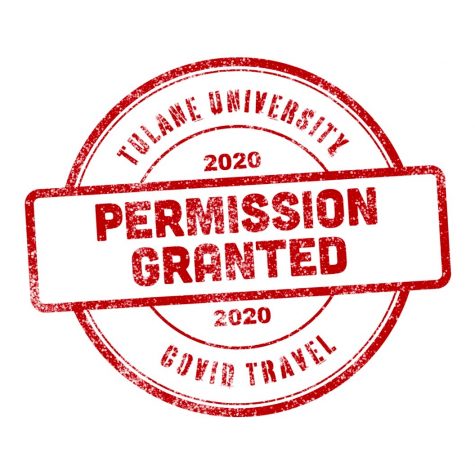OPINION | Tulane’s ‘ban’ on travel belittles students
October 6, 2020

Tulane University’s recently issued Fall 2020 Student Travel Protocol sparked confusion and questions among students who wish to venture outside of New Orleans, Louisiana, during the school year. The travel “ban” consists of a vaguely worded policy which remains vastly misunderstood by or unknown to the student body. The protocol is one of many communications from the administration detailing the ever-changing rules and regulations for this unusual semester.
The revised travel protocol, which Tulane Campus Health released in a lengthy email on Aug. 26, requires students to submit their potential travel plans to Case Management and Victim Support Services ahead of the proposed excursion. The dean of students and other administrators are then tasked with contacting the student to discuss the petition.
This discussion, however, is simply the university determining if the proposed trip is necessary. If the plan is approved, students who live on campus must quarantine off campus for a period of at least 48 hours upon returning to New Orleans. As would be expected, a negative COVID-19 test result is also required before the student can return to campus and it must be submitted to the university prior to resuming in-person class or on-campus living.
The justification for these new travel measures is exceedingly dubious. The single claim offered in support of the protocol is that air travel can increase the risk of exposure to COVID-19. While this may be true, such a blanket statement neglects other forms of transportation and fails to justify such a restrictive policy.
A significant fraction of Tulane students are from Louisiana. As such, they are unlikely to fly home. Their exposure to the coronavirus while traveling is therefore limited. On that same note, Tulane continues to invite prospective students from all over the country to visit campus. This appears hypocritical to the administration’s desire to contain the influx of potential external contaminants.
Furthermore, the distrust of students inherent to this policy seems to have little support in the situation on the ground at Tulane. One of the most simple and effective means of curtailing disease transmission, the wearing of face masks and social distancing, is widely respected by the student body.
A taboo has emerged against the failure to wear a mask in public on campus. Individuals who intentionally don’t wear a mask in public are seen as, at the very best, uncouth and flagrantly irresponsible. Of course, there are still outliers who continue to imperil both the Tulane community and the broader New Orleans population.Thankfully, these individuals appear to be the exception and not the rule.
Nevertheless, Tulane’s student travel protocol is predicated on the thought that Tulane students are incapable of deciding for themselves when they need to travel and by what appropriate means. Another assumption that could be operating in the background is that students are either too immature or too ignorant to follow basic public health guidelines for reducing COVID-19 exposure while travelling. There are, unfortunately, a minority of students for whom these judgments are valid. But, with the vast majority of Tulane students, the administration need not be so cynical.
However, cynicism only captures part of the issue here. Probably unintentionally, this policy is insulting to the average student. Instead of bureaucratizing the process of travel, which could also conceivably take a hit on the mental health of students who want to safely see their families in person, the administration and Campus Health should treat students as the reasonable adults they have expected them to be since returning to Tulane.
Planning to test students when they return from outside the New Orleans area makes a great deal of sense, but the new student travel protocol is not the way to do it. The university should instead allow students to exercise their rationality and expect them to follow the protocols outlined by public health organizations. Tulane must also revise the protocol to provide a more adequate description of off-campus options for quarantine or do away with it all together. While it is understandable that the university wishes to act conservatively during such unprecedented times, they need not diminish the student body’s ability to act responsibly.








Reflect • Oct 15, 2020 at 11:28 am
Great points, Robert! Especially given that Tulane continues to invite families to campus from all over the country with minimum health checks. But I would also note that students aren’t as benevolently cautious as you might have assumed. Even this past weekend Dean Woodley noted that there were multiple violations not only of the Tulane CoC, but also New Orleans public health guidelines. Noting that our unstable progress in terms of virus numbers depends on the weakest links on and off-campus (50 compliant students can be infected by 5 in noncompliance), there really is no other way to ensure that the campus keeps our numbers low (other than cancelling classes but clearly we’re past that point).
Robert Chumbley • Oct 8, 2020 at 11:23 am
@Helen
Because complaining is fun
Helen • Oct 6, 2020 at 6:31 pm
Haha why even complain about this? Just travel, you’re an adult. How is the university going to know what you do?